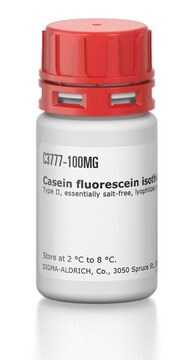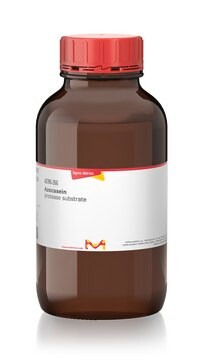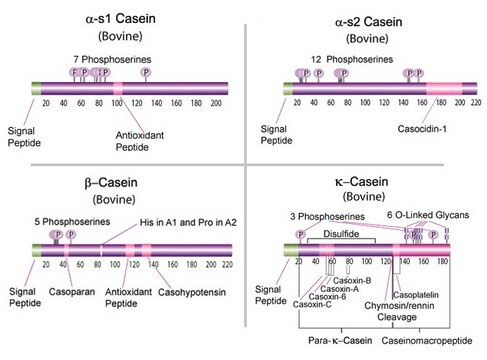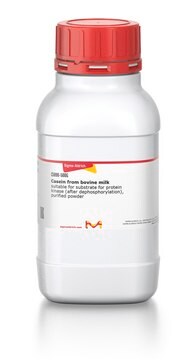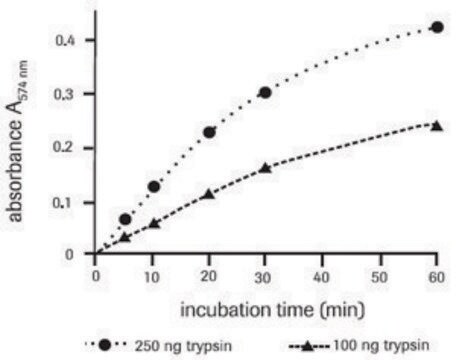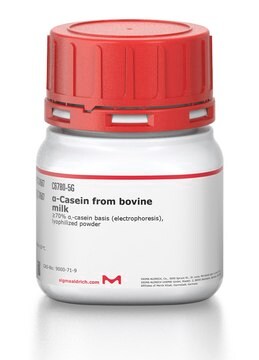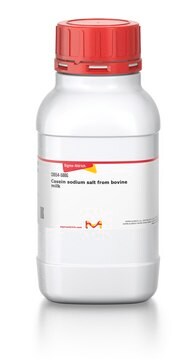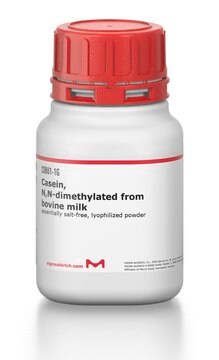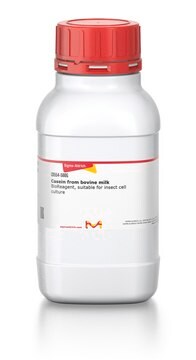C0528
Casein fluorescein isothiocyanate from bovine milk
Type III, essentially salt-free, lyophilized powder
Synonym(s):
FITC-casein
Sign Into View Organizational & Contract Pricing
All Photos(2)
About This Item
Recommended Products
type
Type III
Quality Level
form
essentially salt-free, lyophilized powder
extent of labeling
≥50 μg FITC per mg solid
solubility
water: 5 mg/mL, clear to hazy
storage temp.
2-8°C
Looking for similar products? Visit Product Comparison Guide
Application
Casein fluorescein isothiocyanate from bovine milk has been used:
- in accessing zona pellucida (ZP) and perivitelline space (PVS) to evaluate changes induced by protease treatment
- to make a reference line in immunochromatographic devices
- in running gel for the documentation of proteinases
highly sensitive protease substrate
Biochem/physiol Actions
Casein fluorescein isothiocyanate is mainly used as a substrate in estimating the protease activity of psychrotrophic bacteria. It is also used as a substrate for determining the activity of bacteria in milk.
Storage Class Code
11 - Combustible Solids
WGK
WGK 3
Flash Point(F)
Not applicable
Flash Point(C)
Not applicable
Personal Protective Equipment
dust mask type N95 (US), Eyeshields, Gloves
Choose from one of the most recent versions:
Already Own This Product?
Find documentation for the products that you have recently purchased in the Document Library.
Customers Also Viewed
Characteristics of digestive enzymes of calanoid copepod species from different latitudes in relation to temperature, pH and food
Freese D, et al.
Comparative Biochemistry and Physiology. Part B, Biochemistry & Molecular Biology, 162(4), 66-72 (2012)
Ryan R Cupo et al.
Cell reports, 40(13), 111408-111408 (2022-09-29)
The AAA+ protein, Skd3 (human CLPB), solubilizes proteins in the mitochondrial intermembrane space, which is critical for human health. Skd3 variants with defective protein-disaggregase activity cause severe congenital neutropenia (SCN) and 3-methylglutaconic aciduria type 7 (MGCA7). How Skd3 disaggregates proteins
The supplementation of culture medium with protease improves the hatching rate of mouse embryos
Lee DR, et al.
Human Reproduction, 12(11), 2493-2498 (1997)
Yong Tang et al.
PLoS biology, 17(2), e3000136-e3000136 (2019-02-07)
Endosymbiosis has driven major molecular and cellular innovations. Plasmodium spp. parasites that cause malaria contain an essential, non-photosynthetic plastid-the apicoplast-which originated from a secondary (eukaryote-eukaryote) endosymbiosis. To discover organellar pathways with evolutionary and biomedical significance, we performed a mutagenesis screen
Tomasz Chamera et al.
Journal of molecular biology, 431(11), 2180-2196 (2019-04-27)
Hsp104 is a yeast chaperone that rescues misfolded proteins from aggregates associated with proteotoxic stress and aging. Hsp104 consists of N-terminal domain, regulatory M-domain and two ATPase domains, assembled into a spiral-shaped hexamer. Protein disaggregation involves polypeptide extraction from an
Protocols
Our General Protease Assay Procedures and Substrates overview.
Our team of scientists has experience in all areas of research including Life Science, Material Science, Chemical Synthesis, Chromatography, Analytical and many others.
Contact Technical Service